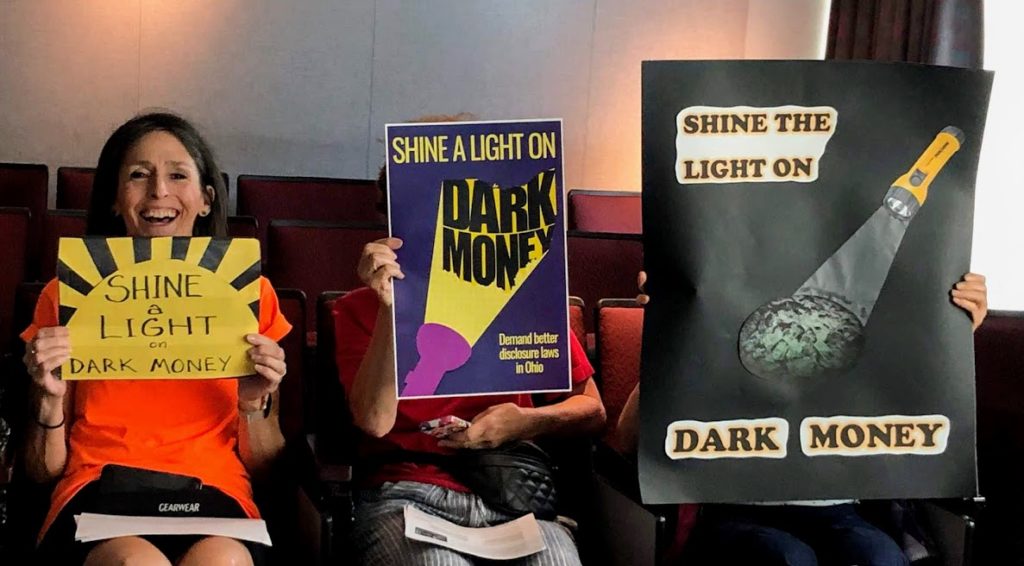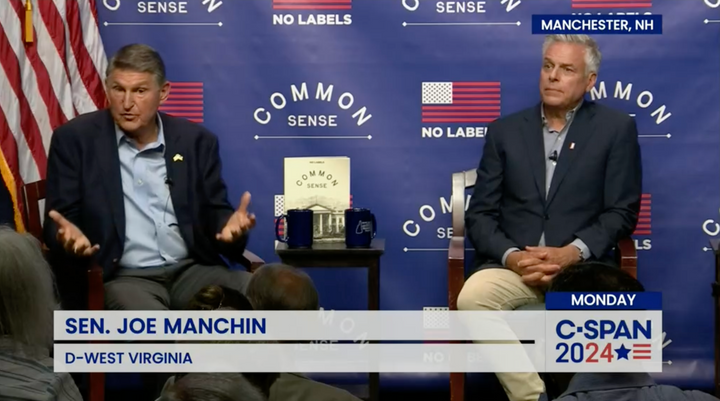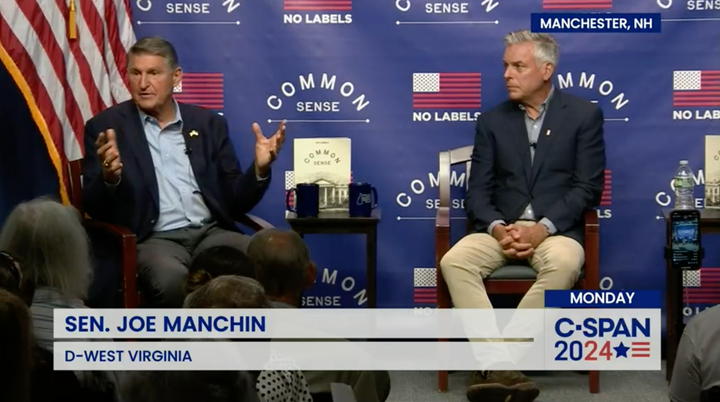'It's a Secret, a (c)(4) Is a Secret': Dark Money Powers $60 Million Bribery Scheme in Ohio
Last week, the FBI arrested Ohio House Speaker Larry Householder and four associates in a bribery investigation over a law that sends $1 billion from ratepayers to bail out two nuclear power plants.

Any executive would jump at the opportunity to earn a return of 1667% on an investment, compared to the typical 10% returns from the stock market.
That impressive rate of return was what FirstEnergy Solutions, an Ohio coal and nuclear energy company, got when it paid out $60 million in dark money to secure a $1 billion bailout through the state government, according to information released from a federal bribery investigation.
Last week, the FBI arrested Ohio House Speaker Larry Householder, a Republican, and four associates on a racketeering conspiracy that made national headlines for both the scope of the dark money enterprise and the directness of the quid pro quo involved.
The scandal shows how effective dark money spending by “social welfare” nonprofit groups can be in securing legislative favors and breaking the existing safeguards on improper government actions. What’s more, the bribery charges illustrate how strengthening disclosure laws around the ultimate sources of election spending would have enabled Ohio voters and watchdog groups to uncover the corporate money sources earlier, while the bailout bill was being rushed through the state legislature by Republican leaders.
At issue was HB 6, a controversial bill signed by Republican Gov. Mike DeWine on July 23, 2019, which bailed out two nuclear power plants near Cleveland and Toledo owned by FirstEnergy. The Akron-based company, now known as Energy Harbor Corp., was undergoing bankruptcy proceedings at the time, brought on in part by the lower operating costs of natural gas energy. FirstEnergy claimed that without an infusion of cash the plants that employed 1,400 people would have to shut down within two years—even as, it was later revealed, it wired millions of dollars to dark money groups controlled by its statehouse allies.
Speaker Householder front-loaded the bailout, which he introduced three months into his term. FirstEnergy’s close relationship with the new speaker was no secret: Householder flew to President Donald Trump’s inauguration on the company’s plane. The rescue effort, opposed by consumer groups, added new fees to every electricity bill in the state to keep the two nuclear plants running, handing the company over $150 million a year through 2026—hence the billion dollar total. It also scaled back Ohio’s wind and solar energy goal from a maximum of 12.5% by 2027 to 8.5% by 2026, and would have eventually ended the requirements, even as renewable energy has become more widespread and affordable. John Finnigan, lead counsel for the Environmental Defense Fund, testified of HB 6 in April 2019, “This bill is nothing but a brazen boondoggle of a bailout for a bankrupt business.”
The FirstEnergy bailout bill passed the Ohio House by a vote of 51-38, with Speaker Householder calling back state representatives from their summer vacations to cinch it.
Last week, after FBI agents arrested Householder at his farm outside of Columbus on July 22, U.S. Attorney David DeVillers described the case as “likely the largest bribery scheme ever perpetrated against the state of Ohio.” Others arrested were former Ohio Republican Party Chairman Matthew Borges, prominent statehouse lobbyist Neil Clark, co-founder of a Columbus-based consulting firm Juan Cespedes, and Householder adviser Jeffrey Longstreth.
The full scope of FirstEnergy’s push to pass HB 6 was documented in a May 2019 report, “Connecting the Dots,” by the non-profit, non-partisan advocacy group Common Cause Ohio. The group’s analysis found that in the previous two election cycles, FirstEnergy’s PAC and employees contributed over $1.2 million to legislative and statewide candidates, and gave the maximum to Householder’s campaign committee, with over $25,000. Statehouse watchers noted that as Householder maneuvered to be elected speaker in 2018, FirstEnergy spent heavily on the primary campaigns of Republican candidates who backed his bid. Householder’s campaign committee contributed as well to over a dozen candidates, building his base of supportive representatives, and at least nine candidates backed by Householder ended up winning.

The key entity in the push to pass the nuclear plant bailout was Generation Now, a 501(c)(4) organization that was not required to disclose its donors. According to the federal investigation, over three years Generation Now received $60 million from what is officially called “Company A,” a reference to to FirstEnergy Solutions. In May 2019, Generation Now, which was formed with help from Householder’s adviser Jeff Longstreth, put $225,000 worth of ads on TV and radio in support of the bailout.
The Supreme Court’s 2010 ruling in Citizens United authorized corporations and outside groups to spend unlimited amounts on elections, as long as they weren’t in “coordination” with campaigns or political parties. What followed in Ohio, and was uncovered in the federal investigation, floored it into the territory of illegal coordination.
Before and during HB 6’s passage, millions of dollars in transfers—up to $8 million in May 2019 alone—flowed from Company A to Generation Now, an “entity secretly controlled by Householder” according to the criminal charges. The nonprofit’s funding went into mailers and political gifts, and Householder skimmed up to $400,000 to pay off credit card debt and for Florida home costs, according to the charging document.
Tape recordings of longtime Columbus lobbyist Neil Clark in federal possession establish the explicit coordination of Generation Now with Speaker Householder’s political operation:
Looking back at attempts by watchdog groups to raise flags, Catherine Turcer, executive director of Common Cause Ohio, told Sludge that Householder’s rush to pass the bill was out of the ordinary.
“One interesting thing about HB 6 was that it was like a zombie—we’d think it was dead, but it would come back to life,” Turcer said. “It looked like it never would have enough votes to get out of the House—we’re talking about corporate welfare, and FirstEnergy had enough money to make campaign contributions. We’ve bailed them out a number of times, so it was wildly unpopular to do another bailout.”
In 2013, FirstEnergy signed a 17-year, $102 million deal for naming rights to the stadium where the Cleveland Browns play and which can host international soccer games and concerts—a brand name which fans are now wondering about keeping.
Immediately after HB 6’s passage, a repeal campaign was launched by a group called Ohioans Against Corporate Bailouts, which was quickly undercut by more dark-money tactics. A new LLC called Ohioans for Energy Security popped up to spend $1 million on a campaign against the repeal effort, spending $644,000 on broadcast TV ads, $316,000 on cable, and $33,000 on radio.
“It was clear we had a dark money problem,” Turcer says. “There were these xenophobic ads that occurred during the referendum.”
One ad rumbled, “The Chinese government is quietly invading our American electrical grid” over images of the Chinese military, making it what a Cleveland Plain Dealer newspaper editorial called “the sleaziest scare ad in recent memory in Ohio.”
“It was also clear that we weren’t going to get good disclosure,” Turcer said. “The powers that be were happy with the system they had.”
The Ohio Elections Commission made a recommendation in 2010 that corporations spending money on political ads should report their activities, but there was no mechanism for disclosure. “We were able to make some estimates [of FirstEnergy-backed spending] based on the number of ads, but it’s not the same as knowing,” Turcer said.

Beyond the misleading ads, the bailout’s supporters hired “blockers” to interfere with the referendum’s signature effort through illegal bribes and intimidation, even launching a parallel drive that paid workers double to gather signatures with no legal weight. In October 2019, a U.S. District Judge rejected a request by the repeal campaign for more time to gather at least 265,774 valid signatures from registered voters and place the question on the 2020 ballot, effectively ending the drive.
With last week’s arrests, Common Cause Ohio and other groups are calling on the Ohio General Assembly to repeal HB 6, and Gov. DeWine called on Householder to resign. But the systemic issue of strengthening the state’s disclosure laws, which allowed FirstEnergy to launder messages in favor of its bailout, remains to be addressed. Ohio’s disclosure laws for the names of entities making independent expenditures regarding candidates are relatively low, which aids transparency—$250 for General Assembly candidates, $500 for statewide candidates. But the dark money loophole is still intact if the big money originators behind political spending, like the kind that muddied the waters against the repeal effort, remain opaque.
The most pressing reform task coming out of the HB 6 scandal, Turcer says, is making sure there is disclosure of the funding sources of all political advertisements.
“HB 6, was created in the most corrupt process possible—through a misinformation campaign—so voters and constituents couldn’t understand what was happening. The General Assembly needs to reconsider regulating energy utilities, possibly. The next thing they need to do is pass a good disclosure bill.”
“We’re asking legislators who took advantage of dark money to repudiate it and shine a light on it,” Turcer said. “We also need better disclosure of lobbying activities, such as when lobbyists are acting as fundraisers.”
Common Cause Ohio and allies have been looking at sample disclosure language from states such as California, Montana, and Connecticut, which lead the way in requiring groups spending on elections to disclose their top donors, according to Turcer. Requiring dark money groups such as LLCs and 501(c)(4) organizations that buy election ads to disclose their funding sources to state agencies enables voters to know the source of the money behind potentially-misleading ads.
Jen Miller, the executive director of League of Women Voters of Ohio, which works alongside Common Cause Ohio, also hopes the General Assembly looks at the shadowy process by which HB 6 was passed along with its possible repeal.

“The challenges we see in this scandal reflect Ohio’s lack of transparency in campaign finance, as well as our long history of gerrymandering, which makes it very difficult for voters to know who is paying for campaign ads,” Miller told Sludge. “When voters call for dark money loopholes to be closed, they’re often ignored by lawmakers who feel very secure in seats.
“We raised the flag about Generation Now’s ads in September of last year, as petition gatherers were being intimidated, and we think that if the funders had been public at that time, they would have behaved differently,” Miller said.
“Issue campaigns and candidate campaigns should have to share how they’re spending money and who’s funding their ads—and to have all that to be searchable, with systems that better allow voter groups and reporters to analyze campaign finance, and better requirements for disclosure of whether lobbying activities was for or against,” Miller said.





Comments ()